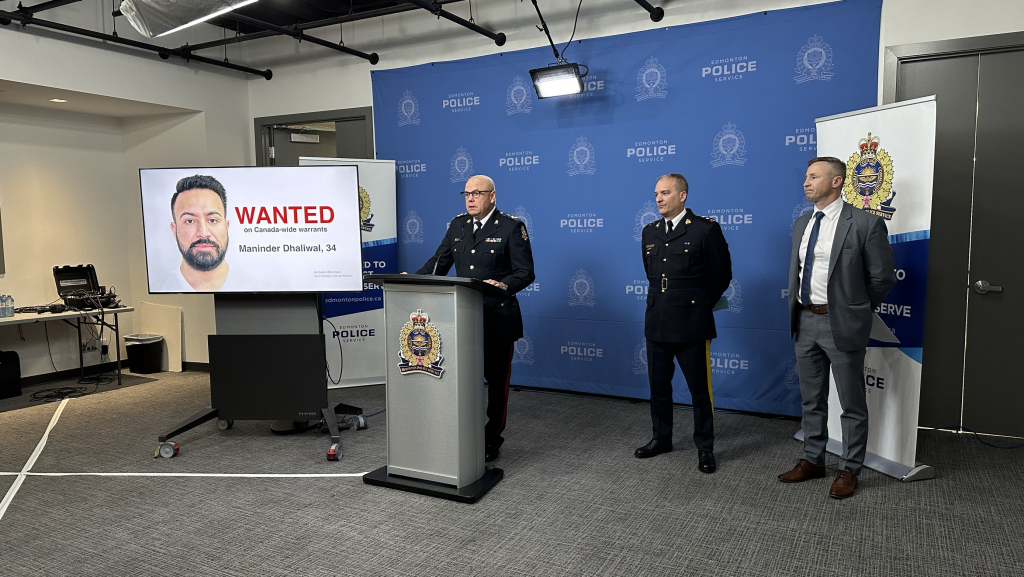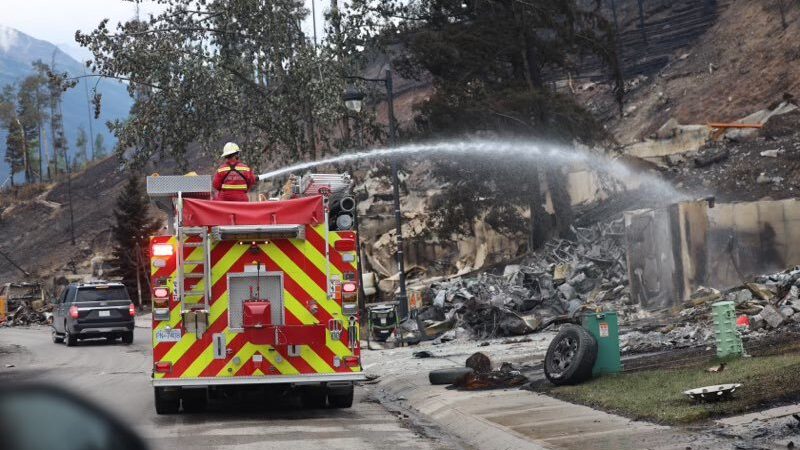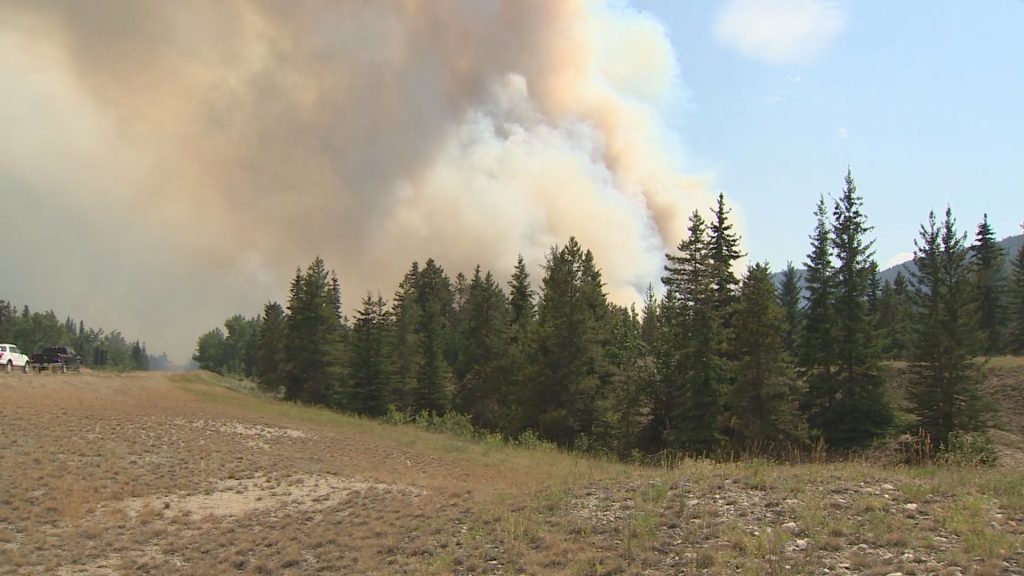Arson, extortion and ‘currency of fear’ not extinguished in Edmonton
Posted January 10, 2024 8:48 am.
Last Updated January 10, 2024 8:56 am.
Edmonton residents are on edge after under-construction homes in separate parts of the city were destroyed by fire 24 hours apart.
Fire crews battled Monday’s early-morning blaze that broke out in a newly built home on the corner of 98 Avenue and 225A Street in the Secord area.
Edmonton police tell CityNews that fire is “believed to be related to the extortion events that have been occurring.”
EPS investigators were on the scene Monday looking for signs of arson, Edmonton Fire Rescue Service (EFRS) District 4 Chief Darren Stolk told CityNews. Stolk said at the time it was possible the fire was linked to recent extortion cases reported in several communities.
That was the second newly built home to go up in flames in 24 hours, after crews were called to a fire on Alwood Bend in the Allard neighbourhood on Sunday.
Police say the fire on Alwood Bend is still under investigation by EFRS.
No one was injured in either incident, but both fires impacted neighbouring homes, resulting in damage to several properties.
Fire investigators brought in Marshal, a dog trained at sniffing out ignitable liquids such as gasoline as accelerants. Investigators and the dog could be seen going through the basement of the Secord home, with investigators placing markers in several spots of the house.
Stolk says it’s important for people to get to know their neighbours and to look out for each other. He says doorbell cameras are also a good idea, and keeping an eye on homes in your neighbourhood.
Victims need to find the confidence to come forward: criminologist
Daniel Jones, chair of justice studies at Norquest College and a former ESP member, says the community has to “stand together with the police and knock the fear down, so these individuals get brought to justice.”
“These organized crime groups, they have enough confidence in the fear that they have put out there that they are still acting on these things and they are controlling the narrative with the fear and they are controlling people from actually cooperating with police with fear,” Jones said.
“All of these groups have a tendency of using that currency of fear to make sure that they are insulated from prosecution.”
Jones says police investigators are doing what they can to stay on top of the situation.
“The currency of fear is used by organized crime groups to maintain their shelter and maintain that they don’t get arrested,” Jones said. “Obviously the police are doing a good job – they have arrested several people involved, which is good, and hopefully that starts to help people build confidence that they are willing to speak to the police. Because this just doesn’t stop unless people start to have confidence in the police and again, just like organized crime adapts, police need to adapt.
“People are burning houses down, there’s a risk and it’s amazing how quickly those fires can spread. This is brazen and it’s just a disregard for human life and they need to be stopped and police need to do what the police need to do, but they can’t do that without the cooperation of the community.”
Robert Gordon, a professor of criminology at Simon Fraser University, was expecting the recent arrests made by EPS to deter groups from continuing to set fires.
“It is a surprise,” Gordon told CityNews Tuesday night. “I would have thought that the groups involved here would be shutting down and fleeing now that the police became involved and are clearly aware of what’s been going on.
“I guess it may well be a delay.”
Gordon believes if victims haven’t been forthcoming, that could be part of the issue. “They’re important for any prosecution,” he said.
“It really would not take much in my view to tip the balance. Police officers know that and if they can convince the victims easily enough that it’s worth their while to participate in an investigation, in prosecutions, because the outcome is going to be valuable, then I would think that everything will fall into place.
“It hasn’t been long really since police have been moving on this. When the message gets out there that the police are doing this and the courts are not tolerating this, then you should start to see it turn around.”
Brampton, British Columbia, Oregon
Gordon reiterates there are three separate “nodes” involved in these extortion-related cases.
One being Brampton, Ont., where he says the Peel Regional Police have “stepped up to the plate and gotten on with the job.”
“There’s another node, which is B.C., and the individual who has been arrested in Abbotsford is from the Punjabi community. And the third node is in Oregon.
“They’re tied together and they are linked to a group in Punjab, so it’s difficult interjurisdictional work. These things are tied together, but I don’t know anyone who has done any work looking at the linkages between these three nodes.”
Gordon says people need to have to confidence to be able to move on the prosecutions: “They have to know that they are going to be on safe ground.”
He believes there will be more “developments” over the next week.
“Who knows what’s going on in the South Asian community in Edmonton, and the extent to which builders in the area are getting together and starting to assist the police in identifying people and also indicating a willingness to cooperate with prosecutions.”
Edmonton mayor speaks with business owners
In a statement, a spokesperson for Amarjeet Sohi says the Edmonton mayor was made aware of the arson and extortion calls “a few weeks ago.”
“Mayor Sohi immediately reached out to the city manager and chief of police to share these concerns and has remained in touch with some of the impacted businesses,” the spokesperson said.
“The mayor appreciates the collective efforts of Fire Rescue and EPS, and all businesses in Edmonton deserve to conduct their business without fear and intimidation. The City of Edmonton is in touch with other cities in Canada who are experiencing this issue and we are working on a coordinated response with other levels of government.”
CityNews reached out to Mike Ellis’ office, Alberta’s minister of public safety and emergency services, for comment. A spokesperson says Albertans deserve to feel safe.
“This government has zero tolerance towards violent and organized criminal activity. This situation is currently under investigation, and we will be monitoring it closely while EPS conducts their investigations. Any further questions should be directed to EPS.”
Extortion task forces
Peel Regional Police recently launch an Extortion Task Force, and on Jan. 6 a hotline was launched for anyone with tips on what they are calling “a disturbing trend of extortion attempts” that primarily targeted members of the South Asian business community.
Peel police say victims are contacted through a variety of social media platforms and demands for money are made under threats of violence, which have occurred in some incidents.
Calgary police tell CityNews, “at this time extortion is not something we are currently seeing in Calgary.”
While they do not have an arson or extortion task force in place, they say that “could change if this trends starts to show up in Calgary.”
Jones says even without a specific extortion task force in Edmonton, Crime Stoppers is a great and often underused tool.
“I think if these individuals are afraid to come forward, using Crime Stoppers is a good option right now, unless they set up a full-time tip line,” Jones said.
WATCH: Edmonton police confirm gangs extorting business owners
Jones feels the task force is a good idea.
“It’s a lot of work and it’s tough and it’s almost impossible to do without people making the complaints and supporting,” Jones said.
Gordon agrees task forces are the way to go, and says that’s the sort of “unified action” that will “knock it out”— referring to extortion.
“If the police in Alberta, RCMP and the city police services are on the ball, they already will have some measure of the characters or the names of the people involved. So they will have their usual suspects and should be able to throw together a working group fairly quickly and they will have a very positive effect on this nonsense,” Gordon said.
Organized crime groups adapt and change
Jones says organized crime groups are “opportunistic” and that similar things have happened in the past – adding gangs “shift and adapt” with the current times.
“If there’s a disruption to drug trafficking and drug sales and all the sudden the individuals in organized crime groups, they shift and they adapt. And that’s one of the things organized crime does really well is shift and adapt,” Jones said.
“And you’ve seen that right from when gambling was the primary thing and then you’ve got legalized gambling and legalized this and all the sudden things shift. Marijuana is legalized and they adapt and this is them adapting in a big way and it looks like in a national way to put significant amounts of fear in the community.”
Jones says this dates back to similar issues in Vancouver and Edmonton in the 1990s.
“In Edmonton in the late ‘90s we had a whole bunch of very similar things pop up,” Jones said. “Not necessarily extortion, but a lot of drive-by-shootings, a lot of Molotov cocktails and again it’s a cyclical thing. And a lot of time it changes with whatever they have to adapt to make the money that they need to make because if you’re an organized crime person, you can’t go on EI if you’re losing your money. You need money to live and a lot of these guys live pretty high-level lives.”








